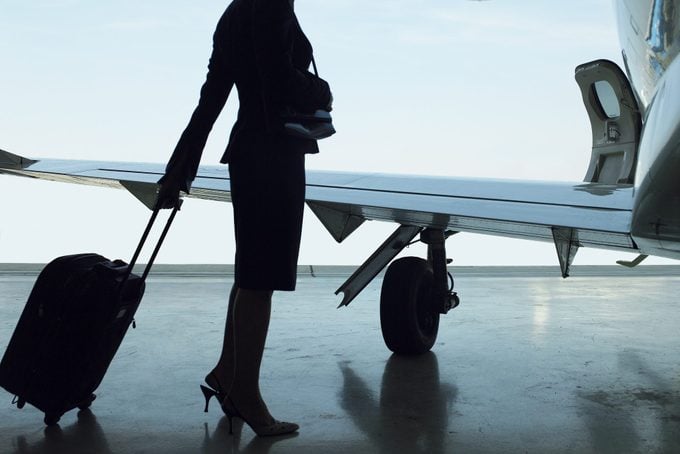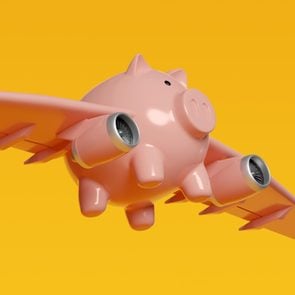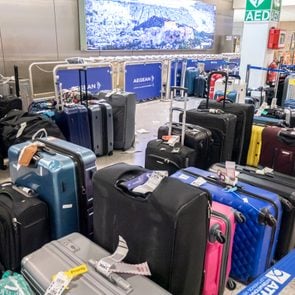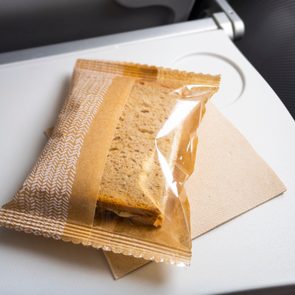I Was a Flight Attendant During the COVID-19 Pandemic—Here’s How It Changed the Job for Good
Updated: Feb. 15, 2023
As a flight attendant during the COVID-19 pandemic, I got used to change. Now I'm navigating the new normal in a job I love.

The COVID-19 pandemic upended the airline industry in 2020, and while a lot of the changes it prompted—mask mandates, for one—have since been revised, others remain in effect. Here, a flight attendant for a major U.S. airline (who is using her middle name to protect her privacy) discusses the ways in which the pandemic permanently changed the job. As a flight attendant during COVID-19, she offers a reason to be thankful for the work the cabin crew does and a reminder that a little kindness goes a long way in the air.
Being a flight attendant is a dream come true. I get to travel around the world, meet new people and have adventures—what’s not to love? But being a flight attendant during COVID-19 really made me rethink my career choice. The pandemic changed everything, from the first thing we flight attendants notice about passengers, to our cabin duties to our schedules.
Like so many of my peers (and the world), I was grounded for the first six months, riding out quarantine and trying not to go crazy. I started back as a flight attendant in September 2020, and it was a totally different experience than I was used to. There were new rules to follow when you fly, and a lot of them had to do with enforcing mask mandates. Masking was so divisive, and it felt like my job morphed into the mask police. I did it, but—and this is one of my biggest flight attendant secrets—I really disliked it.
Thankfully, in April 2022, most airlines (including mine) lifted their mask mandates for flight attendants and passengers alike. That doesn’t mean my job is back to normal, however. In my opinion, the COVID-19 pandemic permanently changed air travel in some clear ways, both positively and negatively.
Masks are optional but encouraged
When I took my first trip as a flight attendant, almost no one in the United States wore a mask on a plane. During the pandemic, everyone had to follow the rules—especially flight attendants. Today’s air travel falls in the murky in-between. Masking has been normalized, so we see it fairly frequently, even if there isn’t a mandate any longer.
Some people still choose to mask up, while others still vehemently oppose masks. As a flight attendant, my job has become less about enforcing mask rules and more about mediating disagreements about them.
Truth: It can get tiring. As flight attendants, our jobs are first and foremost about making sure you get to your destination safely, but some days it feels as if I’m playing referee when a passenger gets offended by another’s decision to wear a mask.
On the plus side, those of us who deal with the public appreciate the passengers who mask up when they’re feeling unwell. Even if you had a negative COVID-19 test, we still don’t want whatever germs you have. (Yes, we see you coughing!)
What you can do: If you’re sick, the one thing we’d love for you to wear on a plane is a mask. And don’t fight other passengers about their mask choices.
Cleaning protocols are stricter … in theory
Fact is, the COVID-19 pandemic has made all of us more aware of how germs are spread, particularly in airplanes. And that’s a good thing. While we don’t have all the “enhanced” cleaning protocols we did during the height of the pandemic, we’re still cleaning more often and more thoroughly than before.
At least we’re supposed to. Sometimes there’s so little time between one flight and the next that all we can do is quickly clean up visible messes.
What you can do: Bring your own disinfecting wipes and wipe down the high-touch surfaces on your seats before you settle in for the trip. We won’t be offended!
There are fewer fees for customers
Another major bonus for customers that came out of COVID-19 is reduced fees. Many airlines changed their policies about refunds and waived fees during the height of the pandemic, back when people really needed an incentive to take to the skies. My airline is among those that decided to keep the more relaxed ticketing rules, at least for now.
What you can do: Read the airline’s cancellation policy before you book, but if you need to change or cancel your flight, it’s worth calling customer service, because you may be eligible to have those fees waived.
Supply chain issues mean we might not have what you want
The airline industry isn’t the only one to feel the pain of supply chain disruptions since the start of the pandemic. And while I don’t know for sure whether the pandemic directly threw our supply chain into disarray, it’s only been an issue since COVID-19 began. My airline has had a lot of problems getting the supplies we need when we need them.
Some of our normal vendors have gone out of business. Shipments have been stuck in faraway ports. And there often aren’t enough workers to unload the trucks at the airport. It feels like these days, it’s always something.
This means I have to improvise. I still try to give the customers the best service I can, but it can get embarrassing. Recently, I had to serve a VIP passenger a meal on a flimsy paper plate. I always appreciate it when travelers take these hiccups in stride.
What you can do: Recognize that you may have to make adjustments on the fly (pun intended) and be flexible if things aren’t the way you want them. If you’re really worried, bring your own snacks and drinks—as long as they’re nonalcoholic!
So many flights are flying with a skeleton crew
It’s not just supplies that can be hard to come by at times. Crew members are few and far between these days.
You’ve likely noticed that more flights than ever are being rescheduled, delayed or canceled. Many are even deadheaded—flown to another location without paid passengers. Some of that is due to more extreme weather events, but a lot of it has to do with a lack of employees to crew the plane.
I can’t speak for every airline, but mine is severely understaffed right now, in every area. The biggest problem is the shortage of customer service representatives. Customers will wait on hold for hours or attempt to use a website that keeps crashing, trying to get an issue resolved. Frustrated, they turn to us for help. But we can’t do much for them.
I get it: They see us standing around in uniform and wearing a name tag, and they assume there’s something we can do. Unfortunately, we don’t have access to certain systems, so our hands are tied.
What you can do: Understand that while we interact with you as the customer, we aren’t customer service specialists. Need help checking a bag? We got you. Need help changing a flight or reversing a bill? You need to call in or talk to someone at our desk.
Our schedules are even more unpredictable
Scheduling flights has always been a little unpredictable, but being a flight attendant during COVID-19 is completely chaotic. And I don’t see that changing anytime soon. Budget cuts, staff shortages, route changes and other issues mean that my schedule can change multiple times within a few days. Not only that, but flight attendants are working more flights, and with fewer crew members per flight.
I’ll be honest: It’s stressful! We’re expected to provide the same level of service and follow the same flight attendant rules with less support and more hours under our belts. That’s why we’re so appreciative when passengers understand that we’re overworked and just doing the best we can.
What you can do: This affects passengers indirectly. When we feel stressed and rushed, it’s hard to give our best to you. Expect the unexpected. Assume that there is a high chance your flight will change, so bring extra medication, drinks, snacks and a change of clothing.
Many more flight attendants suffer from mental health problems
As you can probably imagine, extra work and staff shortages can wear us down. So can combative passengers and the ever-present risk of COVID-19. None of that has been great for flight attendants’ mental health.
My sense of safety, especially in my job, was really shaken during the height of the pandemic. Do you worry that riding in an airplane puts you at a higher risk of getting ill? Try flying multiple trips in a row and interacting with every person on board, knowing they’re coming from all over the globe. The stress has really gotten to me, and many of my co-workers and I don’t see that changing anytime soon.
Honestly, being a flight attendant during COVID-19 is tough. Flights aren’t as fun as they used to be, and there’s an added level of tension. We’re worried about another pandemic or a health emergency midair. We’re worried about not being able to do our jobs properly with the resources we’re given. We’re stressed about people fighting with one another—or us. We’re also worried about losing our jobs or burning out. During the pandemic, I saw a darker side of humanity, and now that I know it exists, I’m scared.
What you can do: Be patient and kind when talking to flight attendants and other passengers. (Flight attendant gifts never hurt either!) Working together, we can make flying fun again.
We love what we do
A lot has changed since COVID-19 shook up the travel industry in 2020. Much of it was good—for both flight attendants and passengers. Some, admittedly, was less than ideal. Still, despite the difficulty of being a flight attendant during COVID-19, I’m not ready to quit.
At the end of the day, I love what I do, and that hasn’t changed.


